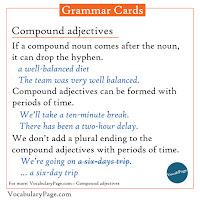Compound adjectives
In English, some adjectives can consist of two or more words. These are compound adjectives. Compound adjectives are usually written with hyphens when they are used in front of a noun they modify. For example, in the phrase ‘man-eating lion’, ‘man-eating’ is a compound adjective. ‘Man eating lion’ means something different. As you can see, a hyphen changes the meaning of a phrase.
Here are some examples of compound adjectives:
- She has a well-behaved child.
- He is a good-looking young man.
- It’s sugar-free chewing gum.
- They are long-distance lorry drivers.
If a compound noun comes after the noun, it can drop the hyphen.
- a well-balanced diet
- The team was very well balanced.
Compound adjectives can be formed with periods of time.
- We’ll take a ten-minute break.
- There has been a two-hour delay.
- I was on a two-year contract.
We don’t add a plural ending to the compound adjectives with periods of time.
- We’re going on
a six-days trip. - … a six-day trip
Other common types are:
Adjective
|
+
|
Past participle
|
old-fashioned
|
narrow-minded
|
|||
dark-haired
|
|||
Adjective
|
+
|
Present participle
|
good-looking
|
long-running
|
|||
easy-going
|
|||
Adverb
|
+
|
Past participle
|
well-established
|
brightly-coloured
|
|||
densely-populated
|
|||
Noun
|
+
|
Past participle
|
sun-baked
|
wind-blown
|
|||
water-cooled
|
|||
Noun
|
+
|
Present participle
|
eye-catching
|
mouth-watering
|
|||
money-saving
|
|||
Noun
|
+
|
Adjective
|
world-famous
|
sugar-free
|
|||
book-smart
|



コメント
コメントを投稿